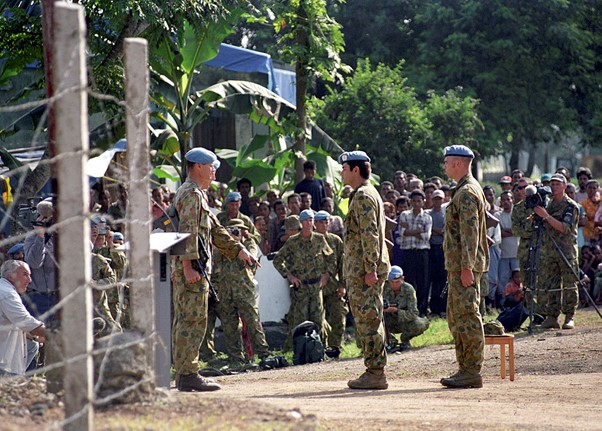John George Sholl

Malone, P. (2000). Troops from 5/7 RAR prepare for the transition ceremony from INTERFET to UNTAET. Defence Imagery.
In 1999, Major John George Sholl was serving as a member of the Army Intelligence Corps, he spoke Indonesian and had studied the history of Indonesia and Timor.
John remembers, “When I first saw this call for nominations, I thought I was the perfect person to go because of my background.”
John’s superiors agreed, and he was soon deployed as part of the United Nations Assistance Mission to East Timor (UNAMET). The United Nations established UNAMET to oversee a peaceful electoral process as the East Timorese were given the right to vote on the future independence of their nation.
Six members of Australia’s Defence Force were selected to travel to Timor-Leste as Military Liaison Officers (MLO) as part of the broader UNAMET deployment. The MLOs served as mediators between the various groups active in the country to ensure peace was maintained during the election. John’s job was to establish relationships with the United Nations’ electoral officers, members of the Indonesian military, the Armed Forces for the National Liberation of East Timor (FALINTIL) and the pro-Indonesian militia groups.
As members of the UNAMET mission, John and his fellow MLOs were always unarmed. A large part of their job involved travelling around their district and establishing as many friendly relations as they could. Often this meant sitting down and drinking a lot of coffee. But it was always tense when they met with the militia groups.
“Meeting with the militia was always problematic. I went to one meeting where men with machetes talked angrily at us. It was somewhat frightening.”
John knew that many of these people had committed violent crimes, and he was under no illusion that the blue UN beret would protect him.
“One thing that played on my mind was the death of the 10 Belgian peacekeepers in Rwanda in 1994. I think we knew deep down that we would have to rely on our good looks and charm to get us out of any trouble – so I was in trouble from the start.”
At the time, going into those meetings unarmed made John nervous, but he later appreciated that a sidearm wouldn’t have saved him if things turned violent, and not having it, helped to keep tensions from rising.
John was involved in maintaining peace and deescalating tension. Less than a month before the vote, John accompanied AFP officer Paul McEwen who was called to attend the scene where a member of the pro-Indonesia militia had murdered a local man.
The community was upset, and emotions were running high. Anger flared when an Indonesian police officer arrived and attempted to talk to the massing group of locals. One man, brandishing a machete, chased the officer and knocked him to the ground.
John was conscious that he didn’t want to breach the UN mandate and become involved in a confrontation, but at the same time, he knew he couldn’t stand by and let a person be killed. So, unarmed, John placed himself between the officer and local. He placed his hands on the local’s shoulders and pushed him back, all while the man waved the blade in his face. John then turned his back on the attacker to help the officer back to his feet and escort him from the crowd. He expected to feel the blade fall on his back, but it never came.
John and Paul’s actions deescalated the situation and prevented more bloodshed. In recognition of the courage they showed, in placing their own life in danger to save another, both were awarded the Bravery Medal.
Like so many Australians who have shown extraordinary bravery, John wears his modesty more comfortably than any medal. “I don’t think I did anything brave. I like to think all officers who found themselves in my circumstances would have reacted in the same way.”
More important to John was the desire to live up to Australia’s military heritage. “We talk about the ANZAC legend as being something intangible, but every day soldiers conduct themselves in ways that have tangible links to that legend. Whether it is overseas on operations or helping in the community in times of natural disaster, Australian soldiers go about their business, and it has a real impact on people’s lives.”
Source: Modern Military Heroes: Untold Stories of Courage and Gallantry, Narelle Bideermann, 2006, Random House.
